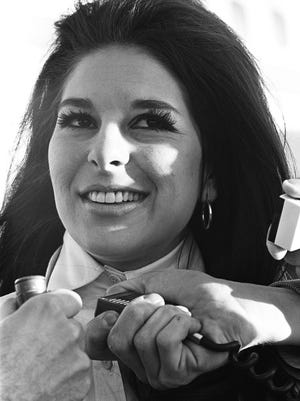Editor’s Note: The following column by former Clarion Ledger columnist Billy Watkins originally appeared in the May 31, 2016, edition of the Clarion-Ledger.
Music fans know the importance of Friday.
“It was the 3rd of June, another sleepy, dusty Delta day.”
That is the opening line of one of music’s most discussed, examined and appreciated songs — “Ode to Billie Joe,” written and performed by Bobbie Gentry, who was born in Mississippi’s Chickasaw County. When her parents divorced and her mother left for California, Gentry moved in with her grandparents in Leflore County, near Greenwood.
“Ode to Billie Joe” was selected by Rolling Stone magazine as one of the top 500 songs of all time. It went to No. 1 on the Billboard Hot 100 and cracked the Top 10 on the Easy Listening and R&B charts. Billboard also rated it the No. 3 song of 1967.

She was only 22 when she recorded it. The tune earned Gentry three Grammy Awards — Best Pop Vocal Performance, Female; Best Solo Vocal Performance, Female; Best New Artist.
And here is one of those strange-but-true facts: “Ode to Billie Joe” was the B-side of Gentry’s first single. The A-side, which Gentry’s team at Capitol Records believed had the best chance of becoming a hit, was “Mississippi Delta,” a gritty, hard-driving song that was a complete opposite of “Ode to Billie Joe.”
Right about now you are probably expecting a quote from Bobbie Gentry about the success of the song, what inspired her to write it, and what was it the girl and Billie Joe threw off the Tallahatchie Bridge? And why did he jump to his death off that bridge?
I do not have quotes from Gentry, but my effort shouldn’t be questioned. I have been chasing Bobbie Gentry for years, longer than any person I’ve chased in my newspaper career. I finally reached her brother via email a few years ago. He said to write her an email, send it to him and he would make sure she got it. I did, and I believe he did his part. But I never heard from her.
I’m not alone in my quest to find the singer/songwriter..Gentry had two hits with Glen Campbell: “All I Have to Do Is Dream,” which reached No. 6 on the country chart, and “Let It Be Me,” which made it to No. 4 on the Adult Contemporary chart.
When I called Campbell’s management team a decade or so ago, I was told: “We haven’t heard from her in years and have no idea where she is. If you find her, please tell her to call us. We would love to talk to her.”
From everything I’ve been told by people in the music business, from Los Angeles to Nashville to Muscle Shoals, Gentry is living a secluded life in Los Angeles. Her last known performance was on Christmas night 1978 on “The Tonight Show with Johnny Carson” and on Bob Hope’s 1981 “All-star Salute to Mother’s Day.”

Most of those who worked with her on “Ode to Billie Joe” are deceased, including the orchestral arranger Jimmy Haskell.
The first person I talked to who worked with Bobbie Gentry was my friend, Norbert Putnam, who played bass for Elvis Presley, played on hundreds of hits as a session musician and produced Jimmy Buffet and Dan Fogelberg among others.
“I did one session with her in Muscle Shoals,” he said. “She came in, waved to us. Was very professional and smart and really focused. We recorded ‘I’ll Never Fall In Love Again.’ The song did nothing in the U.S. but was No. 1 in England. That happens a lot in the music business.
“But I wasn’t around her any more than that. Just that one session, and I regret I didn’t get to go to dinner with her and talk music.”
I touched base with Putnam a few days ago and told him I was finally writing the Bobbie Gentry column, even though I hadn’t talked with her. He asked if I had interviewed Rick Hall, the legendary producer out of Muscle Shoals. His catalog includes producing Mac Davis’ “Baby, Don’t Get Hooked On Me”; Clarence Carter’s “Patches” and Paul Anka’s “Having My Baby.”

I told him I didn’t have Hall’s contact information..
“I do,” he said. “Let me see what I can set up.”
So early afternoon Tuesday, Putnam called me. “Here’s Rick Hall’s number. He’s expecting your call.”
That’s Norbert Putnam, the Forrest Gump of the music business.
Hall, 84, was vacationing on the Gulf Coast but said he was happy to talk about Bobbie Gentry. Hall produced her last hit, “Fancy” in 1969.
“First time I heard ‘Ode to Billie Joe,’ I was in my car and nearly ran off the road,” he said. “The song hit me that hard. I was like, ‘Gracious, that’s me in that song.’ And that’s the secret of the song — it’s real life that people in the South can absolutely relate to. Like the line ‘pass the biscuits, please.’ Where else have you heard that? But that resonates with 99 percent of the people from the South — and people all over the world are enamored with the South and the music that came from here.”

Hall is right. Listen to the lyrics, and it’s a 4-minute, Southern-based novel that paints HD pictures in our mind’s eye: “I was out choppin’ cotton, and my brother was balin’ hay” … “I’ll have another piece of apple pie, you know it don’t seem right” … “That nice young preacher, Brother Taylor, dropped by today/Said he’d be pleased to have dinner on Sunday. Oh, by the way … ”
There is a reason more songs aren’t written in such a conversational way: It’s extremely difficult, a gift that few possess.
“As soon as I heard that song, I knew I wanted to produce her. Then once I saw a picture of her, I really wanted to work with her,” he said, laughing. “Capitol Records finally arranged for me to meet with her in 1969. I flew to California, and we went to dinner.
“I was expecting this Southern, backwoods, Delta woman. She was anything but that. Sophisticated. Bright. She had studied at UCLA and then studied music and composition (at the Los Angeles Conservatory of Music). We hit it off and became really good friends, in a professional way. She and I were raised the same way so we spoke the same language. I said, ‘I’d really like to work with you,’ and she said, ‘Great, when can we start?’ ”
She was a headline act in Las Vegas, along with Elvis Presley and Tom Jones. She also was dating casino multimillionaire William Harrah, whom she married in 1969. She was 25. He was 58. The marriage lasted just three months.
“When she came to Muscle Shoals to record, she arrived in a Learjet, which Harrah had bought for her, and had a five-carat diamond ring on her finger that just about covered her hand,” said Hall, the author of the book “The Man From Muscle Shoals.” “She was an artist, too. She was painting pictures that were selling for $20,000 apiece. But none of that changed Bobbie Gentry. She remained a genuine, Mississippi girl who just happened to have made it.”
The album “Fancy” consisted of mostly cover songs. But Gentry wrote the title track, and In 1970 it reached No. 8 on Billboard’s Adult Contemporary chart and earned Gentry a Grammy nomination for Best Female Pop Vocal Performance.
It would be her last hit.
She married country star Jim Stafford in October 1978, and they had a son. But the marriage lasted just a month shy of a year.
“I can sort of understand why she quit music and went into seclusion,” Hall said. “She had a lot of bad memories of the music business. She didn’t like the way things worked with record companies and all that. Didn’t like what she was getting paid.
“I’ve tried every way in the world to get in touch with her, but she simply won’t accept calls.”
But I will. Bobbie Gentry, if this story somehow lands in your hands, please contact me. And, for what it’s worth to your “Ode to Billie Joe” is one of my 20 favorite songs of all time. Your music matters. So does your story.
I look forward to having the chance to tell it.

